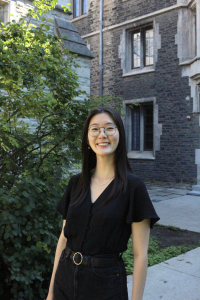
Third year PhD student Amy Huang plans meetings with a mission. The graduate students’ Women in Economics group has a mission to foster a sense of community among women in economics at the University of Toronto. The goal is to create a more inclusive learning and working environment and Amy Huang is part of the effort.
“Having a group like Women in Economics that I can take part in is great because my research addresses the topic of equity from an academic perspective, whereas Women in Economics is a hands-on way of trying to make a difference directly,” Huang explained.
Right now, Huang and her colleagues are preparing for the group’s International Women’s Day (IWD) observance on March 7th that will bring together graduate students, undergraduates, and faculty.
“We’re celebrating with an informal networking session. It’s an opportunity for female-identifying undergraduate students to meet graduate students and faculty,” said Huang. “I think faculty will value speaking with undergraduate students who might be interested in a career in economics.”
The event’s informal nature is in line with how the group functions by design.
“The Women in Economics group is there to provide support for female students, to let them know they are welcome in the department, that they can do well here, and that academia is a pathway for them,” Huang said. “We try to keep it non-hierarchical. We’re all coming together to discuss how we can support each other and the next cohort of female students coming in.”
That non-hierarchical informal structure enables members of the group to participate in peer-mentoring to help all participants share their current experience and to plan their future lives.
“A meeting might involve female PhD students who have started a family coming to talk about their experiences, discussing their learning process, and giving advice to younger students,” Huang said.
While the group has an emphasis on peer-to-peer support, Huang recognizes the role female faculty members have played in her own studies since her undergraduate days at the University of Toronto.
“I think Jenn Murdock‘s ECO220 class was really influential for me. It was one of the first times I felt truly engaged with the material and saw the practical applications of economics,” Huang remembered. “And Michelle Alexopoulos taught my master’s level macro class. Her approach to teaching and the depth of her knowledge really inspired me to pursue further studies in economics.”
The emphasis on support in a social setting is so important to Huang that she also works to organize those opportunities as president of the Graduate Economics Union.
“Especially since COVID, the need for social opportunities is so important,” Huang said. “It matters a lot to me to create an inclusive and comforting environment at the department where people want to come in and see each other. A lot of the best work comes from collaboration, even if it’s just passing each other in the hallways and briefly discussing an idea.”
Participating in the two graduate student groups compliments Huang’s own research projects.
“My main interests right now lie in education and education policy. I also care quite a bit about equity within the education system,” she explained. “The project I’m thinking about right now is about grade inflation in the secondary school system. In particular, whether grade inflation has disproportionate effects on different subgroups based on income and socioeconomic status.”
These kinds of alignment between research interests and community service are especially important in academia, where peer-reviewed journals, conference organization, and events all demand significant effort from scholars who volunteer to support the development of their disciplines.
“I feel the volunteer work I do is aligned with my research into education equity,” Huang said. “It’s part of supporting a positive culture at the Department of Economics for students and faculty to work in.”
Return to the Department of Economics website.
Scroll more news.
